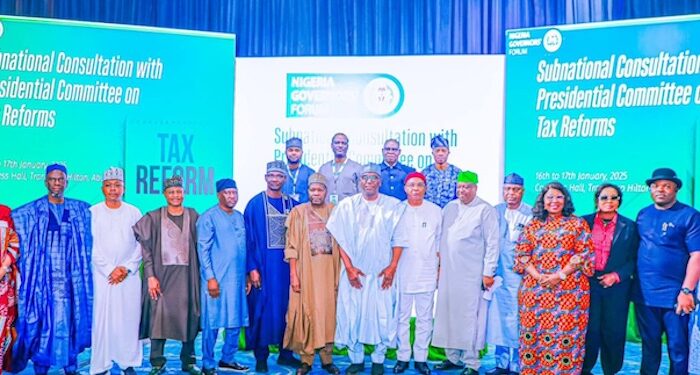After weeks of intense debate, the 36 state governors and the Presidential Tax Reform Committee have reached an agreement on the revised formula for sharing the Value Added Tax (VAT) in Nigeria. The new structure, which came after extensive deliberations, has adjusted key components to ensure a more equitable distribution of VAT proceeds across the country.
VAT Sharing Formula Update: At the core of the agreement is the adjustment of the VAT sharing formula. The governors agreed to retain the current 50% equality share of VAT proceeds, a consistent factor from the previous arrangement. However, the new formula sees a shift in the derivation-based allocation, which has increased from 20% to 30%. Similarly, the population-based allocation will now account for 20% of the total, a reduction from the previous 30%.
The agreement marks a pivotal moment in the ongoing tax reforms in the country. It comes after northern governors had expressed concerns about the earlier tax reform proposals, particularly the allocation based on derivation, which they argued could disadvantage certain regions. The deal also aims to improve fiscal equity and promote economic stability, with members of the Nigeria Governors’ Forum (NGF) emphasizing their support for the comprehensive overhaul of Nigeria’s tax system.
In a joint communique signed by Alhaji Abdul Rahman Abdul Razaq, Chairman of the NGF and Governor of Kwara State, the governors and tax reform committee members reaffirmed their commitment to modernizing Nigeria’s tax framework, while ensuring no increase in the VAT rate or reduction in Corporate Income Tax (CIT) at this time. The communiqué further outlined support for the continued exemption of essential goods and agricultural products from VAT to safeguard public welfare and stimulate productivity.
Senate Projects N100 Trillion Budget: In related fiscal news, the Senate has projected a record N100 trillion aggregate expenditure for the 2026 fiscal year. This projection follows the submission of the N49.7 trillion 2025 Appropriation Bill by President Bola Tinubu, which is currently under consideration. The Senate’s move to free up funds held by key government organizations, including the Nigerian National Petroleum Company Limited (NNPCL), is expected to play a significant role in achieving the ambitious budget target for 2026.
Senator Solomon Adeola, Chairman of the Senate Committee on Appropriation, stated that the National Assembly is working to increase the federal government’s revenue by unlocking funds that have been tied up in subsidies and operational expenses. According to Adeola, if these steps are successfully implemented, Nigeria could see its budget more than double by next year.
Senate President, Senator Godswill Akpabio, emphasized that the budget should prioritize the welfare of Nigerian citizens, making it more than just a ledger of revenue and expenditure but a tool for national development. Akpabio also called on all stakeholders to ensure that the budget serves as a catalyst for prosperity and peace-building in the country.
Tax Reform Concerns in Northern Nigeria: Despite the breakthrough on VAT sharing, concerns remain in northern Nigeria regarding the broader tax reform initiatives. Senator Natasha Akpoti-Uduaghan, Chair of the Senate Committee on Local Content, noted that northern stakeholders were “jittery” about the reforms, partly due to the region’s perceived ill-preparedness for such sweeping fiscal changes. Akpoti-Uduaghan urged northern leaders to invest in reviving the region’s socio-economic infrastructure and cultural heritage to better cope with the challenges posed by the tax reforms.
Furthermore, northern groups such as the Nigeria First Project Initiative and the Coalition of Northern Nigerian Students Forum have raised alarms about the politicization of the tax reform debate, especially with the 2027 elections on the horizon. The groups warned against political actors using the tax issue to advance personal agendas, urging citizens to engage in the debate constructively.
ASUU Voices Opposition to Tax Bill: In another development, the Academic Staff Union of Universities (ASUU) has strongly opposed the proposed Nigeria Tax Bill 2024, warning that it could negatively impact public universities in Nigeria. ASUU expressed particular concern over the bill’s plan to replace the Education Tax with the Nigeria Education Loan Fund (NELFUND). According to the union, the proposed changes could drastically reduce funding for the Tertiary Education Trust Fund (TETFund), which has been instrumental in the development of Nigeria’s public universities since 1993.
ASUU’s Zonal Coordinator for the Bauchi region, Professor Namo Timothy, cautioned that if the bill is passed, TETFund could see its funding sharply reduced in the coming years, leading to a severe strain on the nation’s tertiary education system. The union has called for the National Assembly to halt further debate on the bill to preserve the integrity of TETFund and ensure continued support for higher education in Nigeria.
Conclusion: As the debate over Nigeria’s tax reform continues, the latest agreements on VAT sharing signal progress, but challenges remain in addressing the concerns of regional leaders, educational institutions, and political stakeholders. The tax reform is expected to be a critical factor in shaping Nigeria’s fiscal future, with the potential to broaden the tax base, improve revenue generation, and enhance economic stability. However, balancing equity, transparency, and the interests of various groups will be key to ensuring its success.


